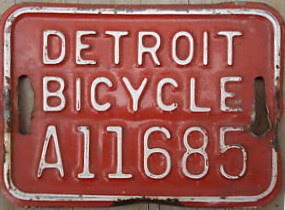by Larry Lagarde
Case in point:
An attempt to raise bicycle registration fees 500-2500%.
That's right. At a time when cities such as Cleveland & Milwaukee as well as states like Minnesota have eliminated bicycle registration requirements and fees, other cities and states are looking or have looked at bicycle registration fees as a possible revenue stream.
Over the last 3 years, cities like Seattle, Detroit and (most recently) New Orleans (plus states like Oregon & Washington) have attempted to substantially raise bicycle fees. Typically, the stated reasons behind such fee hikes are attempts to reduce bike theft or to provide more funding for bicycle facilities. The sad truth is that such attempts fail miserably, turning the law into a mockery. Look at what happened in the Motor City (Detroit, Michigan).
 In the summer of 2008, just as gasoline prices were reaching their all time historic crest, the Detroit City Council passed an ordinance mandating that police would begin fining all bicycles without a license tag. Although the tag fee was set at $1, bicycle owners were furious. Like the cops had nothing better to do.
In the summer of 2008, just as gasoline prices were reaching their all time historic crest, the Detroit City Council passed an ordinance mandating that police would begin fining all bicycles without a license tag. Although the tag fee was set at $1, bicycle owners were furious. Like the cops had nothing better to do.For over 2 decades, Detroit had repeatedly made the top spot as America's most dangerous city. Detroit's murder rate was off the charts; even the mayor was about to become a convicted felon. So the city was going to criminalize riding a bicycle without a license plate... After a month of being the butt of jokes around the nation, the Detroit City Council repealed the law.
Fast forward to earlier this month and another port city plagued by crime & blight - New Orleans.
On March 11, 2010, New Orleans City Councilman James Carter presented an ordinance to the city council mandating the registration and tagging of bikes being ridden in the city by local residents. Councilman Carter proposed that registration fees be increased from a flat $3 to anywhere from $15 -75 (depending on how the bike's used). That's an increase of 500-2500%. But it gets better.
New Orleans abandoned bicycle registrations when the city was flooded in 2005 by Hurricanes Katrina & Rita. The records from before the storm were lost to the floodwaters (as were countless bicycles).
Besides, the Big Easy had much bigger problems to face (like addressing rampant corruption, a murder rate far surpassing every other North American city and how to repopulate & rebuild the city).
Yet here is the strangest part of all.
Councilman Carter represents the most historic and touristic part of New Orleans - the French Quarter. The Quarter is a compact grid of streets designed for horse and buggy traffic, not modern automobiles. It is also home to an abnormally high number of hotels, restaurants, bars and shops. As a result, traffic congestion is an ever present problem (which is why local Quarter residents have to pay to park on the street).
So why would an elected official risk alienating himself with so many voters? (Photo: Councilman Carter speaking with riverboat behind)
Granted, the city council is scrambling to find revenue; yet, the new, incoming mayor has repeatedly asked the city administration to refrain from enacting new steps that could hamstring the new administration. How strange that the councilman proposed for the ordinance to take affect after the new mayor is in place.
Of course, there are other questions to ask. Is the ordinance enforceable? What's the purpose for the increase? How are any potential revenues to be disbursed? How to tell local resident from tourist or surburban riders commuting? And lastly, if city bike shops must collect the fee, what's to stop residents from shopping in the suburbs rather than the city, depriving the city of yet more sales tax revenue?

